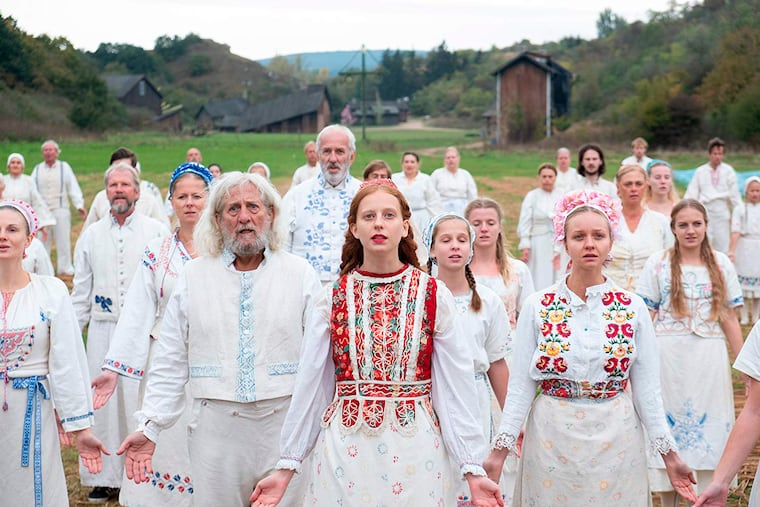Ari Aster, who directed the blood-curdling 'Hereditary’ and the upcoming ‘Midsommar,’ on making movies you can’t shrug off
Ari Aster made last year's scariest horror movie. Now, he's baaaaaack.

For some reason, when a horror director makes a splash, as Ari Aster did last year with Hereditary, people will pester him for a list of his influences.
As if they provide some cinematic Waze app roadmap of Easter Eggs and overt homage that will lead to a destination of facile clarity.
Well, if you want to know about the movies that shaped his new horror movie Midsommar, I’ll make it easy for you: Aster saw thousands of movies growing up, and internalized all of them. A quick cruise through the internet will uncover a list of Midsommar influences that include Amy Heckerling and Lars Von Trier, so make of that what you will.
Just don’t make too much out of it, Aster says.
“Most of the stuff occurs to me after I’ve finished making the movie. Like, when I was cutting this together, I thought, the parallels to the Wizard of Oz are pretty obvious. But I wasn’t aware of it at the time. And I’m glad I wasn’t,” said Aster, whose latest, Midsommar, does indeed involve a young, bereft woman (Florence Pugh) who leaves home for some unsettling experiences in a strange and colorful faraway land. Sweden, in this case.
“There’s nothing worse than a movie that’s strictly about other movies,” he added. “That’s pretty awful, and those movies can become like a really superficial echo chamber. We all have influences, but the goal, after you’ve soaked all of that up, is to make something deeply personal.”
Aster was processing the messy end of a relationship when he sat down to write Midsommar, which he has widely referred to as his break-up movie (influences, if you’re still scoring at home, include Albert Brooks’ Modern Romance).
His feelings took shape as a story about Dani (Pugh), who just suffered an unspeakable tragedy, and though you’d think things couldn’t be worse, they actually are. Aster gives the audience information that Dani doesn’t have: that her boyfriend (Jack Reynor) intends to dump her, but has decided to delay the break-up until she’s emotionally stable enough to withstand it.
Thus, she ends up the fifth wheel on a bachelor trip to Sweden, where the guys want to experience a once-every-90-years pagan ceremony that involves drugs and Swedish women, and things go downhill from there.
Whereas Hereditary — about a family destroyed rather mercilessly by a curse — was strictly horror, Midsommar adds elements of very black humor, and saves a final, ghoulish chuckle (depending on your interpretation and frame of mind) for the very last shot.
“I do see the film as a very dark comedy,” said Aster, who has written some overtly funny situations into the movie — including Will Poulter is a comically shallow sidekick — and plays a bit impishly with the contrast between setting and genre. He’s set Midsommar in the northern latitudes at solstice time, a land of midnight sun, so there is almost literally none of horror cinema’s fundamental element: darkness. Midsommar is insistently, relentlessly sunny — right down to the dispositions of the visitors’ eerily cheerful, apple-cheeked hosts.
“There are precedents, for this kind of folk horror has been done before, and we’re not reinventing the wheel here,” said Aster, who used The Wicker Man as an obvious model. “The trick is to take the expectations that come with that, the way people accept that we are moving toward something inevitable, and do something different with it.”
Well, it’s certainly different. I’m just going to say bear suit, and leave it at that.
Sometimes, Aster’s movies are so different that audiences have a hard time grappling with them. His movie Hereditary was notorious for that chasm between its rave reviews and D+ CinemaScore, a service that polls regular viewers on their thoughts. It shocked audiences not only for its graphic scenes of death, but for its formula-upending depiction of a mentally unstable mother (Toni Colette) unable to act to protect her family. The movie, he confirmed, borrowed from Greek tragedy — particularly the idea of a gruesome fate from which there is no escape.
“These movies are disturbing. They both make contributions, in their own way, to the canon of existential horror. People trying to grapple with fears for which there is no remedy. Can we ever really know the people in our lives? Can we ever really trust anyone? We spend our lives wrestling with these questions because there are never any easy answers to any of them,” he said.
“I never wanted, with either film, to give the audience something disposable. Something to shrug off so they can enjoy the rest of their day. I want these movies to stay with people, the way meaningful movies do. The movies I cared about the most are the movies that stayed with me."